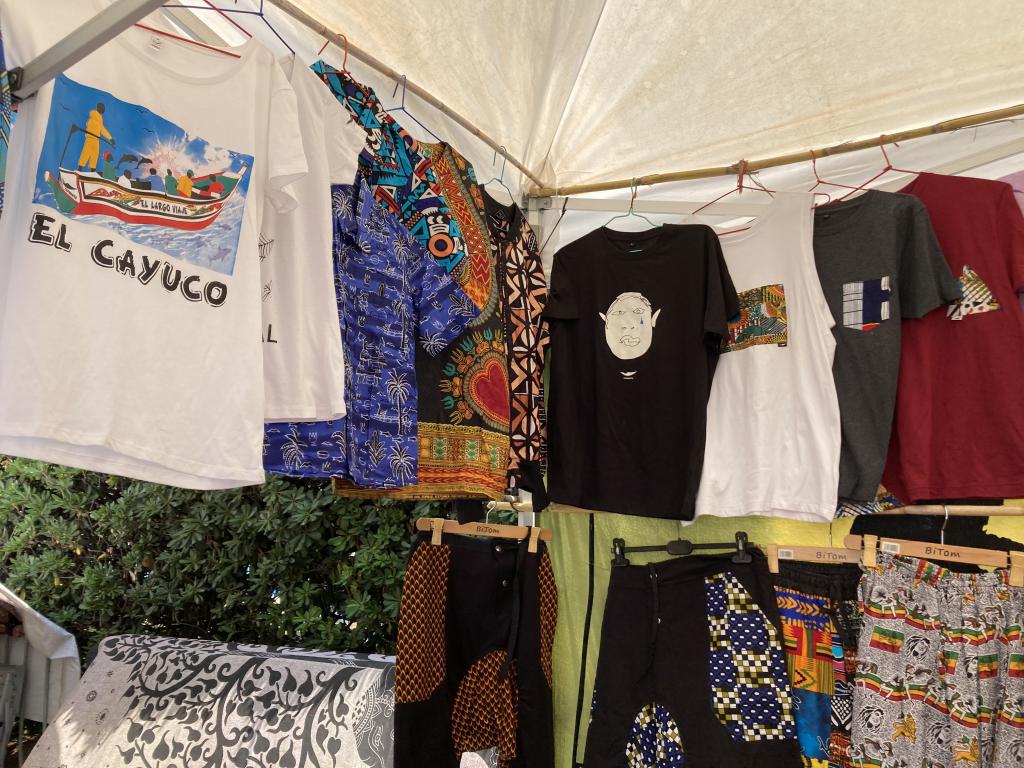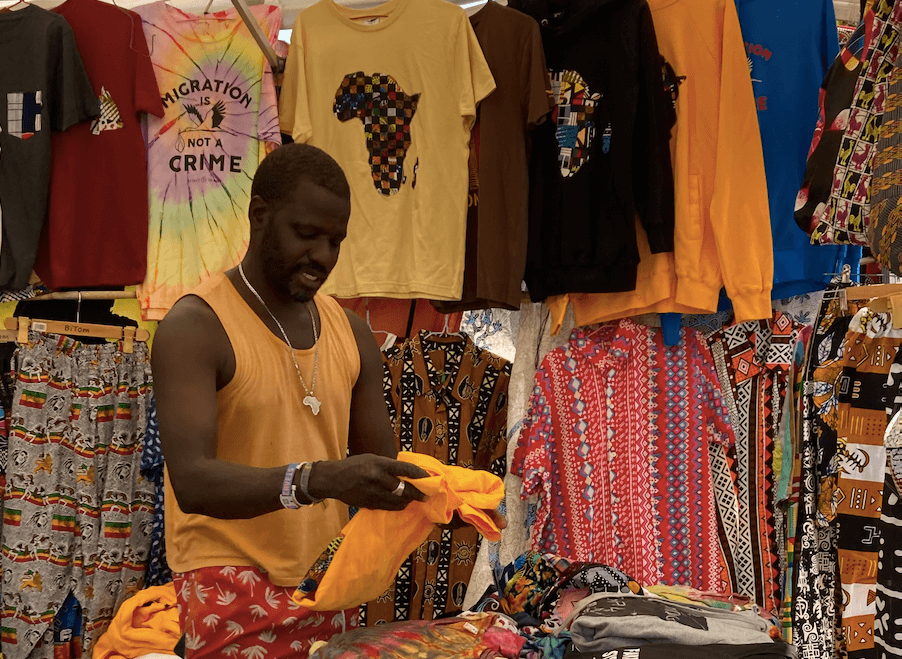There are many stories along the Sitges promenade, but one I’ve learned lately is that of a man called Papu (pictured) who has clothing, bags and decorative objects labelled Top Manta, but he sells from one of the regular stalls.
A few years ago, some of the so-called manteros developed the idea to design and make products themselves rather than sell only the cheap copies you find on their blankets along the paseo or on Barcelona streets. As Papu says, ‘If no one helps us, we have to help ourselves.’
Since then, the Top Manta line has become a registered trademark in Catalunya, sold from market stalls, several shops, and at festivals. They are invited to festivals and events around Spain and other parts of Europe. The group meets regularly to report back and brainstorm ideas, as well as help each other out in any way needed, such as legal aid or getting through a crisis like the pandemic. Most are West Africans, many Senegalese like Papu, though now a few are Pakistani and Latin American, and a few are still manteros.
Naturally I wondered how the street vendors survive, and how they managed to pull together to start their own legitimate business. Papu said there are local activists, lawyers and others in Barcelona and around who donate time and expertise to their defence and general assistance, who also helped them set up the Top Manta line, along with various donors.
They import some fabrics from West Africa, but the designs are all their own, including very striking T-shirts with such designs as a flimsy boat taking people across the sea, or a map of Africa with patches of African fabric, or some strong and simple statement about immigration and legality. New designs are brought in periodically.
This spring Top Manta was invited to the Venice Biennale, in recognition of their tremendous efforts and initiative in forming their cooperative and turning out their designs. A small group travelled from Barcelona to Venice to show how they work, sell products and above all, explain who they are and how they got started, through posters and talking to visitors.
Papu himself has been here about 20 years and speaks fluent Spanish, along with the French he learned in Senegal and his native Wolof, as well as some Portuguese, Catalan, and a little English. He first flew to friends in France, overstayed on his visa, went to family in Portugal and finally came to Spain, where he waited many years for acceptance as an immigrant.
He left Senegal after secondary school and saw his departure as final, as his area was increasingly impoverished, largely due to overfishing by foreign trawlers that drive out local fishermen. In Europe, he has worked in many jobs, from anything he could do around markets, to dog-minder, events host, to mantero, and has managed to visit Senegal over the years.
He has also been volunteering with groups that support kids who have somehow washed up on Spanish shores, and he seems dedicated to that work. When I asked what he would like to do in life, he said he hopes to create his own NGO for youth in West Africa one day. I asked which NGOs here do the best work and he said he sees only the most positive efforts in every one he knows.
I wondered what Papu felt were good solutions for the drama of migration from Africa. He was not for the idea of sending money to governments for development, as he has little faith in current African politicians. Non-governmental organisations do far better, in his experience.
Meanwhile, he feels strongly that those people who arrive here should be processed promptly and provided papers allowing them to work, so that they have at least a basic income and no fear of the police. He is concerned about the rise of the right wing in Spain and elsewhere, and growing overt racism.
Many of those people who have come in recent years are claiming political asylum, fleeing violence as well as the desperation of deepening poverty. They come here to save themselves, better their lives, live peacefully, work hard and contribute to society, as do so many immigrants and refugees the world over. Perhaps your own parents or grandparents once did the same, as mine did, and found a somewhat warmer welcome.

Click here to follow Sitges in English on Facebook, as well as Twitter and Instagram.
Click here to return to Sitges in English home page. Click here for our full archive of Sitges News reports.
Click here to get your business or services listed on our DIRECTORY.
Don’t miss out on the English section in the weekly L’Eco de Sitges (and Ribes edition). Click here to subscribe and have it delivered to your home each week.



